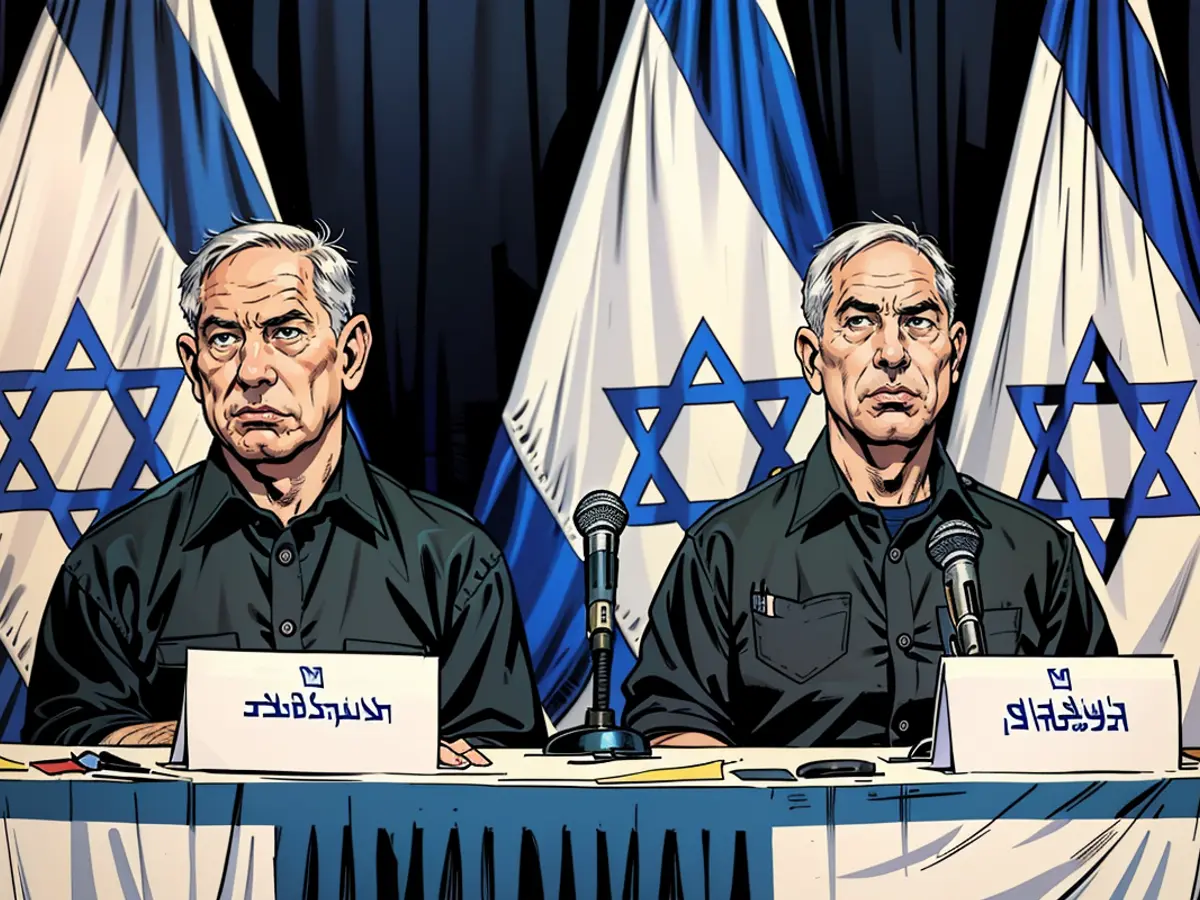Netanyahu accuses defense minister of ‘anti-Israel narrative,’ exposing rift over war in Gaza
Israeli media reported this week that Gallant, speaking to lawmakers in a private security briefing, had dismissed Netanyahu’s war aim of achieving “absolute victory” over Hamas as “gibberish,” branding those who say this is achievable as “heroes with war drums.”
Netanyahu’s office shot back, saying Gallant’s comments jeopardize talks to release the hostages held in Gaza.
“When Gallant adopts the anti-Israel narrative, he harms the chances of reaching a hostage deal,” the prime minister’s office said in a statement. It said Gallant was obligated to pursue the twin goals of Israel’s war in Gaza: Eliminating Hamas and the release of the hostages seized by Hamas in the October 7 attacks.
The barbed exchange is the latest in a series of spats between the two men during more than 10 months of war, and comes as Israel has been bracing for a possible attack by Iran and its proxy Hezbollah in Lebanon. That has prompted the United States to bolster Israel’s defenses, sending a guided missile submarine to the region over the weekend.

Iran and Hezbollah have vowed to avenge the killings last month of Hamas’ political leader Ismail Haniyeh, who died in an explosion in Tehran, and of Hezbollah’s top military commander Fu’ad Shukr, who was assassinated in an Israeli airstrike in a Beirut suburb.
Iran blamed Haniyeh’s death on Israel, and a source familiar with the matter previously told CNN that Haniyeh was assassinated with an explosive device hidden in the guest house where he was staying.
The death of Haniyeh, who had been a key player in ceasefire talks, threatened to derail the negotiations to halt the war in Gaza and escalate the conflict, with Iran warning that “blood vengeance” for the killing was “certain.” Hezbollah also promised that Shukr’s blood “will not have been shed in vain” and threatened to retaliate, forcing Israel to confront the prospect of a war on multiple fronts.
Critics have accused Netanyahu of being more interested in defeating Hamas and preserving his government than returning the hostages. Far-right members of his coalition have threatened to collapse the government should a deal go through.
A group of hostage families on Saturday accused the prime minister of “gambling” with the lives of the hostages to ensure that his government survives, according to the Times of Israel.
The US, Egypt and Qatar – key mediators in talks between the warring parties – have urged Israel and Hamas to return to the negotiating table to consider a “final bridging proposal.” Discussions are set to resume Thursday in the Egyptian capital Cairo or the Qatari capital Doha.
Deepening schism
Gallant, who has emerged as a top interlocutor for advisers to US President Joe Biden, has often stressed the need for a ceasefire deal. He has previously called on Netanyahu to declare that Israel would not establish civilian or military control over Gaza, although the prime minister has remained vague on his plans for the “day after” the war.
In his leaked comments, Gallant also claimed he had in October proposed a pre-emptive attack on Hezbollah in Lebanon, but that Netanyahu had not supported the strike and had missed the opportunity.
“The conditions today for a Lebanon war are the opposite of what they were at the beginning of the war,” Gallant reportedly told lawmakers.
Responding to Gallant’s claims, Netanyahu’s office deflected blame for the failure to reach a ceasefire deal, saying Gallant “should have attacked (Hamas leader Yahya) Sinwar, who refuses to send a delegation to the negotiations, and who was and remains the only obstacle to the hostage deal.”
In a later post on X, a chastened Gallant said he had told the private meeting that he is “determined to meet the goals of the war and to continue the fighting until Hamas is dismantled and the hostages return,” and also criticized the leaks from “sensitive and confidential forums.”
He stressed Israel is facing “challenging days in which we’ll be required to stand firm and take powerful and defensive offensive actions.”
Gallant joins a number of senior Israeli officials to have questioned Netanyahu’s aim of destroying Hamas. In June, top military spokesman Rear Adm. Daniel Hagari said the idea that Israel could “make Hamas vanish” is “throwing sand in the eyes of the public.”
CNN recently reported that nearly half of Hamas’ military battalions in northern and central Gaza have rebuilt some of their fighting capabilities, despite Israel’s unrelenting assault, according to a joint analysis with the American Enterprise Institute’s Critical Threats Project and the Institute for the Study of War.
During the ongoing series of conflicts between Israel and Hamas, the Middle East has become a focal point of global concern. The world is closely watching the developments, particularly the efforts to release the hostages held by Hamas.
Iran and its proxy Hezbollah, aiming to avenge the recent assassinations of key figures like Hamas' political leader Ismail Haniyeh and Hezbollah's top military commander Fu'ad Shukr, have threatened retaliation, potentially escalating tensions in the region.







